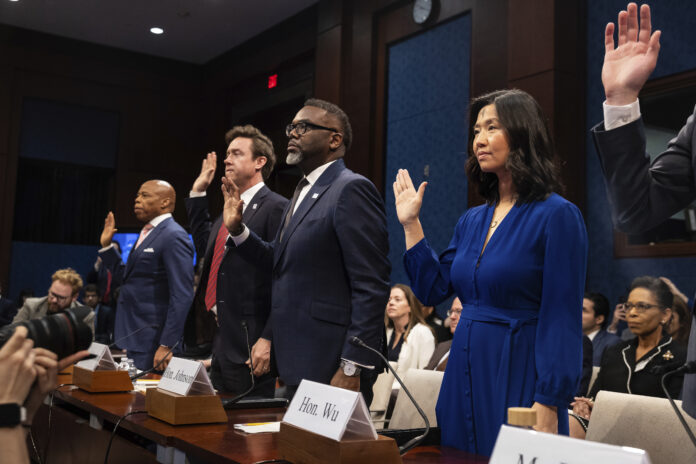New Jersey politics is reaching a fever pitch this September as the 2025 governor’s race between Mikie Sherrill and Jack Ciattarelli escalates, the federal government renews its fight against the state’s sanctuary city policies, and Governor Phil Murphy signs new transparency and labor rights measures into law. Add in a handful of local political twists and scandals, and the Garden State’s political landscape is brimming with developments.
The gubernatorial contest has grown increasingly personal in recent weeks. Republican challenger Jack Ciattarelli accused Democratic nominee Mikie Sherrill of “lying” when she claimed he supported raising the state sales tax, formally demanding a retraction from her campaign. Sherrill, in turn, has sharpened her messaging, telling voters she would “push an LGBTQ education into our schools” despite backlash from conservatives citing the Supreme Court’s June decision in Mahmoud v. Taylor. That ruling expanded parents’ rights to opt their children out of lessons that conflict with their religious beliefs, a position Sherrill openly dissents from.
Meanwhile, the candidates’ broader strategies highlight the stark divide in New Jersey politics. Sherrill’s campaign is leaning heavily on widespread disapproval of former president Donald Trump among Garden State voters, portraying Ciattarelli as a Trump loyalist out of step with moderates. Ciattarelli, who has embraced Trump’s endorsement, is working to center his message on state issues such as taxes, business climate, and education while downplaying national politics.
The tension grew sharper this week when Sherrill demanded Ciattarelli condemn Trump’s recent dismissive remarks about domestic violence. She blasted her opponent’s silence, pointing out that during his time in the legislature, Ciattarelli voted against a bill that would have allowed victims of gender-motivated violence to sue their abusers. In a statement, she called Trump’s comments “flat-out wrong and disgraceful” and urged Ciattarelli to put aside partisan loyalty. The Republican has so far declined to do so, underscoring the clear partisan battle lines heading into the fall.
Despite the heated back-and-forth, polling suggests Sherrill has an edge. A new TechnoMetrica survey shows her leading Ciattarelli by seven points, 46 to 39 percent, among likely voters. Still, Ciattarelli has gained notable local endorsements, including Garfield Mayor Everett E. Garnto Jr., a former Democrat who switched parties to support him. In Hoboken, meanwhile, mayoral candidate Emily Jabbour has launched a new digital ad campaign, highlighting how local politics are also shaping the statewide conversation.
Beyond the governor’s race, New Jersey finds itself at the center of a national immigration debate. The Trump administration has ramped up legal pressure on four of the state’s largest cities—Hoboken, Jersey City, Newark, and Paterson—over their sanctuary policies. Federal attorneys have filed new lawsuits, claiming that restricting cooperation with immigration enforcement is illegal. In court filings, they’ve asked a judge to re-examine a prior appeals court ruling that had upheld the cities’ right to maintain their sanctuary status. With immigration once again dominating headlines, New Jersey’s urban centers could become flashpoints in the national battle over enforcement and local autonomy. For continuing coverage of these issues, readers can follow Explore New Jersey Politics.
At the state level, Governor Phil Murphy recently signed new legislation designed to bring more transparency to the pharmaceutical and public health sectors. Under the new law, members of the state’s Drug Utilization Review Board must publicly disclose any financial connections to drug companies, a measure intended to bolster public trust. Murphy also advanced labor rights with new laws promoting labor history education in schools and prohibiting employers from forcing workers to sit through mandatory political or religious messaging. Both measures reflect the administration’s ongoing focus on workplace protections and education reform.
Not all political developments have been positive. Al-Tarik Onque, a longtime aide to former Newark mayors Cory Booker and Ras Baraka, pleaded guilty to accepting bribes, a case that adds another chapter to the city’s history of political scandal. At the same time, state Republicans are leveling accusations of media bias, criticizing NJ.com for failing to disclose that one of its owners is a major donor to Sherrill and other Democrats.
As the November election approaches, the balance of power in New Jersey remains uncertain. Sherrill holds a lead but faces an energized Republican opponent with deep connections to Trump’s base. Federal battles over immigration could reshape local budgets and law enforcement priorities. And new state laws are set to change the way health officials and employers interact with the public. With all of these moving parts, New Jersey politics is once again proving to be as dynamic, contentious, and closely watched as any in the nation.












